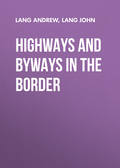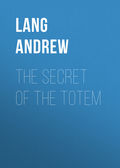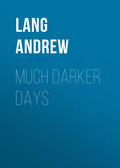
Lang Andrew
He
CHAPTER VI.
THE ZÛ
Our course was now through a series of cross streams, and finally we emerged into a long, perfectly straight, and perfectly tranquil expanse of water, bordered by a path which had every appearance of having been made by the hand of man.
Night fell: a strange, murky night, smelling of lucifer matches, and lit on the eastern horizon by a mysterious light, flaring like a dreary dawn.
Our passage was obstructed by a thousand obstacles, and at one point we plunged into the very bowels of the earth for a distance of at least a quarter of a mile. Next we found the canal barred by a grinning row of black iron teeth, under which we dived as best we might. We were now, Ustâni whispered to us, within the strange and dreaded region known to the superstitious natives as the Zû. For the first time in our expedition we heard the roaring of innumerable wild beasts. The rattling trumpet of the elephant, the drum of the gorilla, the scream of the lion, the chattering of countless apes, the yells of myriads of cockatoos, the growls of bears, the sobs of walri,18 the whistle of rhinocerotes, combined to make a strange pandemonium – strange, I call it, because the zoological learning I had picked up while with Nora at Oxford, informed me at once that the variety of roars, screams, grunts, skreeks, whirrings, which our footsteps seemed to awake in every kind of animal, bird, and insect, could be paralleled only in the pages of the 'Swiss Family Robinson.' Add to this, that it was night, yet dark as a day on the London flags when the fog creeps silently about your feet and, rising from utter blackness, grows white and whiter in its ascent, till it coils round your neck, a white choker!
I can't find walrus in the Latin dictionary nor anything else beginning with W somehow, but it seems all right. – Ed.
Yes, the fog was playing a dark game, but Nora could see it and go one lighter (there were several on the stream we had quitted). She produced a patent electric light.19 Aided by this, we looked about us and saw the strange denizens of the Zû.
It was now that the presence of mind of Leonora saved us. Foreseeing the probability of an encounter with wild beasts, she had filled her practicable pocket (she belonged to the Rational Dress Association) with buns and ginger-bread nuts.
The elephant now walked round, the wolves also circulated, the bear climbed his pole, the great gorilla beat his breast and roared.
Leonora was their match.
For the elephant she had a rusk, a bun for the bear, and the gorilla was pacified by an offering of nuts from his native Brazil.
THIS WAY TO THE CROCODILE HOUSE
we now read, on an inscription in black letters, and, following the path indicated, we reached the dank tank where the monsters dwell. We had arrived at a place which I find it difficult to describe. The floor was smooth and hard.
'What do you make of this?' asked Leonora, tapping her dainty foot on the floor.
'Flags,' I replied phlagmatically, and she was silent.
In the centre of the space was a dark pool, circled by crystalline palaces inhabited by the sacred snakes, from huge pythons to the terrapin proud of his tureen. Again, there was a whipsnake, and a toad, bloated as the aristocracy of old time, and puffed up as the plutocracy of to-day. For such is the lot of toads!
Now a strange thing happened.
'Hark!' said Ustâni; 'hark! hark! hark! a den is opening!'
He was right; it was the den of a catawampuss, an animal whose habits are so well known that I need not delay to describe them.
In the centre of the dark pool in the middle of the vague space lay one crocodile. The rest were sleeping on the banks. The catawampuss secretly emerged from its den – horror, I am not ashamed to say, prevented me from interfering – stealthily crept across the cold floor, and, true to the instincts of all the feline tribe,20 made straight for the water.
'Ah!' cried Ustâni, 'he's going for him!'
The expression was ambiguous, but we understood it.
The catawampuss, cunning as the dread jerboa, crept to the edge of the pool, took a header into it, and then, still true to the feline instincts, swimming on its back, made its way to the crocodile. In this manner it caught the crocodile by the tail and waked it. When the tail of a crocodile awakes the head awakes also. The crocodile's head, then, waking as the catawampuss seized its tail, caught the tail of the catawampuss. The interview was hurried and tumultuous.
The crocodile had one of his ears chawed off (first blood for the catawampuss), but this was a mere temporary advantage. When next we saw clearly through the tempest of flying fur and scales, the head of the catawampuss had entirely disappeared, and the animal was clearly much distressed.
Then, all of a sudden, the end came.
They had swallowed each other!
Not a vestige of either was left!
This duel was a wonderful and shocking sight, and was therefore withdrawn, by request, as the patrons of the Gardens are directly interested in the morality of the establishment.
CHAPTER VII.
AMONG THE LO-GROLLAS
How to escape from our perilous position on the banks of a pestilential stream, haunted by catawampodes and other fell birds of prey, now became a subject for consideration. Our object, of course, was to reach the people of the Lo-grollas, through whose region, according to the prophecy, we must pass before finding the Magician that should guide us to the mummy. Our perplexity was only increased by the discovery that we were surrounded on every side by the walls and houses of a gigantic city. Stealing out by the canal as we had entered, we found to our comfort that this must be the very city mentioned by Theodolitê. As the seeress had declared, a deep and noisome night always prevailed, only broken here and there as a wanderer scratched one of Bryant & May's matches and painfully endeavoured to decipher the number on the door of his house. The streets, moreover, were strewn and interwoven with long strings of iron fallen from the sky.
'The people who wire themselves with wires,' whispered Leonora; 'what do you think of my interpretation now?'
'I shall inquire,' I answered, and I did inquire for the land of the Lo-grollas, but in vain.
Happily we chanced to meet an old man, clothed in a whitish robe of some unknown substance, not unlike paper. This fluttering vesture was marked with strange characters, in black and red, which Leonora was able to interpret. She read them thus. They were but fragmentary.

On the fragments the words, 'Tragedy,' 'Awful Revelations,' 'Purity,' and other apparently inconsistent hieroglyphics might be deciphered.
He had a large and ragged staff; on his back he carried a vast Budget, and he was always asking everybody, 'Won't you put something in the Budget?'
'Father,' said Leonora, in a respectful tone, 'canst thou tell us the way to the land of the people called Lo-grolla, and the place of the Rolling of Logs.'
He stroked his beautiful white beard, and smiled faintly.
'Indeed, child, we not only know it, but ourselves discovered it and wrote it up – we mean, sent our representative,' he answered.
It was a peculiarity of this man that he always spoke, like royalty, in the first person plural.
'And if a daughter may ask,' said Leonora, 'what is the name of my father?'
Stedfastly regarding her, he answered, 'Our name is Pellmelli.'
'And whither go we, my father?'
'That you shall see – as soon, that is, as the fog lifts, or as our representative has made interest with a gas company.'
With these words he furnished an unequalled supply of litter, which came, he said, 'from the office,' where there was plenty, and we were borne rapidly in a westward direction.
As we journeyed, old Pellmelli gave us a good deal of information about the Lo-grollas, whom he did not seem to like.
They were, he said, a savage and treacherous tribe, inhabiting for the most part the ruined abodes of some kingly race of old.
The names of their chief dwellings, he told us, were still called, in some ancient and long-lost speech,
'The Academy,' and 'The Athenæum.'
Leonora, whose knowledge of languages was extensive and peculiar, told Pellmelli that these names were derived from the old Greek.
'Ah,' said he, 'you have clearly drunk of the wisdom of the past, and thy hands have held the water of the world's knowledge. Know you Latin also?'
'Yes, O Pellmelli,' replied Leonora, and Pellmelli said he preferred modern tongues, though it would often be useful to him if he did in his dealings with the Lo-grollas.
'However, if our Greek is a little to seek, our Russian is O.K.,' he said proudly.
He was very bitter against the Lo-grollas.
The Lo-grollas' favourite weapon, he told us, was the club, and he even proposed to show us this instrument.
Our litter presently stopped outside a stately palace.
The street was dark, as always in this strange city, but old Pellmelli paused, sniffed, and, bending his ear to the ground, listened intently.
'I smell the incense,' he said, 'and hear the melodious Rolling of the Logs. But they shall know their master!'
Thus speaking, he led us into a vast hall, where the Lo-grollas were sitting or standing, 'offering each other incense,' as Pellmelli remarked, from thin tubes of paper, which smoked at one end.
'Now listen,' said Pellmelli, and he cried aloud the name of a poet known to the Lo-grollas.
Instantly we heard, from I know not what recess, a rolling fire of applause and admiration, which swept past us with stately and solemn music, like a hymn of praise.
'There,' said Pellmelli, 'I told you so. This is the place of the Rolling of Logs, and yourselves have heard it.'
Leonora said she did not mind how often she heard it, as she quite agreed with the sentiments.
'Not so!' said Pellmelli; and he cried aloud another name – the name of a poetaster – which was almost strange to us.
Then followed through that vasty hall a sharp and rattling crash, as of the descent of innumerable slates.
'Great heavens!' whispered Leonora, 'remember the writing; the place where they slate strangers!'
As we were strangers, and wholly unknown to the Lo-grollas, we thought they might slate us, and, beating a hasty retreat, soon found ourselves with Pellmelli in the dark outer air.
'They are a desperate lot,' said he; 'they won't ever put anything in the Budget.'
He was quivering with indignation; and Leonora, to soothe him, told him the story of our quest for the mummy, and asked him if he could help us.
'We are your man,' said he. 'We propose to-morrow to send our representative to interview a magician who has just arrived in this country. He is a mysterious character; his name is Asher,21 and it is said that he is the Wandering Jew, or, at all events, has lived for many centuries. He, if any one, can direct you in your search.'
He then appointed a place where his representative should meet us next day, and we separated, Pellmelli taking his staff, and going off to lead an excursion against the Ama-Tory, a brutal and licentious tribe.






